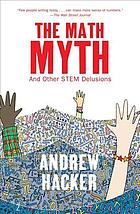
The Math Myth
And Other STEM Delusions
کتاب های مرتبط
- اطلاعات
- نقد و بررسی
- دیدگاه کاربران
نقد و بررسی

Starred review from January 18, 2016
Expanding on a furor-raising 2012 New York Times op-ed that questioned Common Core math requirements, Hacker (Mismatch: The Growing Gulf Between Women and Men), who teaches political science and mathematics at Queens College, takes an in-depth look at the issue and "the mandarins" behind those standards. Currently, national Common Core standards require students to study geometry, trigonometry, and two years of algebra in order to graduate high schoolâthough calculus may be added to the list. Hacker believes these requirements actually stymie student advancement, locking out students hoping to be veterinary technicians, actuaries, software engineers, commercial artists, and cosmetologists because they fail to understand quadratic equations and other concepts that aren't needed to do the job. He also illuminates industry forces at work, including the proliferation of tutoring and test coaching businesses as well as the practice of "deskilling." Hacker calls for a sensible focus on adult arithmeticâthe basic algebra and statistics skills needed to understand interest rates or calculate mileage for expense reportsâand reserving advanced math for the fields where it's actually used. Hacker's accessible arguments offer plenty to think about and should serve as a clarion call to students, parents, and educators who decry the one-size-fits-all approach to schooling.

December 1, 2015
A lively argument against the assumption that if the United States is to stay competitive in a global economy, our students require advanced training in mathematics. In this book, Hacker (Emeritus, Political Science/Queens Coll.; Mismatch: The Growing Gulf Between Women and Men, 2003, etc.) expands on his piece, "Is Algebra Necessary?" which appeared in the New York Times in 2012. The author is dismayed that students are required to pass mandated mathematics courses, pointing out that it is the principal academic reason for the high dropout rate in American high schools and colleges. He shows how the requirement filters out talented liberal arts students, that math in the workplace bears little relationship to math in the classroom, and that the claim that studying math instills desirable modes of thought is built on unverified premises. Further, he alleges that there is no shortage of qualified Americans to fill positions in the computer industry but that the industry prefers to hire foreigners at entry-level positions to keep wages low. To bolster his arguments, the author sprinkles his text with pages of speech balloons containing quotes from former students who agree with him, and he inserts difficult-to-read white-on-black math problems made to look like an exercise in chalk on a classroom blackboard. Such devices are superfluous; Hacker's prose is direct and clear. The final chapter, "Numeracy 101," one of the most fascinating and rewarding in the book, features samples of the kind of material on quantitative reasoning Hacker believes should be taught and that he developed for an experimental introductory mathematics course. Readers who never took algebra, geometry, or calculus, or who have no recollections of what they learned in those courses, will be challenged and engaged by the exercises. Hacker's arguments may convince some anxious students and be welcomed by their parents, but the reaction from academics is sure to be mixed.
COPYRIGHT(2015) Kirkus Reviews, ALL RIGHTS RESERVED.

April 1, 2016
Hacker (emeritus, political science, Queens Coll., NY; coauthor, Higher Education?) challenges the accepted belief that math is essential. While maintaining that basic mathematics is a significant part of education, Hacker contends that the more complex subjects such as algebra and calculus are unnecessary even for many scientific disciplines. Strong voices advocating for an emphasis on science, engineering, and technology have usurped the conversation about math, placing the focus unduly on unnecessarily complex skills. Taking on many of the common arguments, Hacker confronts the assumptions of how much math is needed in careers, that girls do worse in the field, why math is used in college admissions, and the role of standardized testing. The presentation is compelling and logically laid out in an approachable format. Clearly, Hacker is passionate about his stance, but he is very open about his biases, allowing readers to reach their own conclusions. VERDICT Recommended for those who want a more critical look at the prevailing wisdom to find a more balanced approach for their discussions about the significance of advanced math in the education arena.--Rachel Wadham, Brigham Young Univ. Libs., Provo, UT
Copyright 2016 Library Journal, LLC Used with permission.

























دیدگاه کاربران